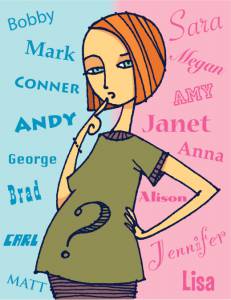Most Popular Canadian Baby Names
The naming of a child is one of the most important parental responsibilities. In Canada, couples have a fair amount of flexibility in the choice. However, there are some established government regulations and they differ by province.
Ontario and Beyond
The majority of the provinces leave it up to the parents’ discretion. Ontario has no laws forbidding any specific names but does not allow the use of symbols or numerals in babies’ names.
A Consumer Services Ministry Spokeswoman, Anne-Marie Flanagan, said, “Choosing a name for a baby is something parents give a great deal of thought to and it’s their responsibility. We absolutely live in a very diverse society……Something may have a different meaning in a different culture.”
Quebec and British Columbia
Quebec and British Columbia are the two provinces that have greater restrictions. They forbid any monikers that may be embarrassing.
The Registrar of Civil Status in Quebec will “invite” parents to reconsider a name choice they believe may subject a child to future bullying. The matter can be taken to court if the parents disagree with the government intervention. In 1998, representatives in Quebec forbade a couple to name their baby “Ivory” because they claimed it did not follow the conventional “Quebecois tradition.” The parents took the matter to court and won on appeal.
British Columbia’s Vital Statistics Act makes it possible for the courts to reject name choices they feel may subject children to ridicule, but the law is rarely used.
2014 Most Popular Canadian Baby Names
According to Baby Center Canada, following are the top ten 2014 baby girl and boy names:
2014 Most Popular Canadian Baby Names for Girls
- Emma
- Olivia
- Sophia
- Chloe
- Emily
- Lily
- Zoe
- Isabella
- Ava
- Aria
2014 Most Popular Canadian Baby Names for Boys
- Jackson
- Liam
- Lucas
- Logan
- William
- Aiden
- Mason
- Noah
- Jack
- Nathan
Countries With Strict Baby Naming Laws
Denmark
Denmark is known for its stringent baby-naming laws. The government has published a list of approximately 7,000 pre-approved names. Parents who want to use an unofficial moniker are required to have permission from their church. Government officials review the request after the church has given its consent. The country requires names to be gender specific. Parents are not allowed to use surnames as first names, and creative spellings of common names are frowned upon and typically rejected.
Germany
Another country that closely monitors baby names is Germany. The registrar’s office has the authority to deny a name if it believes it is inappropriate. Name requirements include:
- The first name must clearly signify a baby’s gender.
- Names must not be ridiculous or offensive
- No unconventional spellings
- Children must not have more than five names
China
Chinese children must have monikers made up of characters that are easily readable by computer scanners. Non-Chinese characters and numbers are forbidden.
Mexico
In Mexico, the government wants to protect kids from the possibility of being bullied due to their names. Monikers thought to be “derogatory, pejorative, discriminatory or lacking in meaning” are not allowed. Circumcision and Rolling Stone are two names banned in Mexico.
Sweden
The Swedish government must approve the baby names of all citizens. The law states: “First names shall not be approved if they can cause offense or can be supposed to cause discomfort for the one using it, or names which for some obvious reason are not suitable as a first name.”
Iceland
Icelandic parents must select a name from an official government list; there are 1,712 male options and 1,853 female ones. Anyone who has other ideas must be granted special permission. Some of the country’s criteria are that names need to be gender specific and have letters from Iceland’s alphabet.
The naming of children is not a task to be taken lightly. Some countries have specific guidelines designed to protect the interests of babies, who don’t have a say in the matter.


